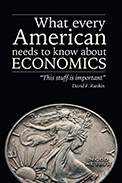
 |
As debates rage around the country about socialized benefits, dramatic increases in the minimum wage, and excessive tax rates, many regular citizens must simply sit on the sidelines and hope that their elected representatives deliver on the promises upon which they were voted in. Using a background in economics both in the academic field and in the public sector, the author of this book warns against the desire to socialize more citizen needs and expand the role of the government. Pointing to the prosperity enjoyed by the tax cuts of the Kennedy, Reagan, and now Trump administrations, the author proposes a roadmap of enabling personal and corporate freedoms and tax reductions in order to actually increase the amount of tax revenue generated, as well as providing for retirement, medical care, necessary wages, and more.
The author’s hands-on experience is absolutely what should inspire trust in his arguments, especially for young adults who may not have lived through the examples he provides. Pointing out the way that government programs start with a temporary intention and then find ways to survive and balloon seemingly indefinitely highlights the need to act now in order to keep the country’s spending habits from becoming harder to recover from. Each chapter covers a different talking point of economic policy or history and only lasts for ten pages at most. This allows the reader to get in, understand, and get out without getting bogged down by excessive data, details, and distractions. Distilling these complex situations down into bite-sized reading allows readers with any and even minimal backgrounds in economics to gain a new perspective and better understand the ramifications of the kinds of proposals being floated around Washington these days.